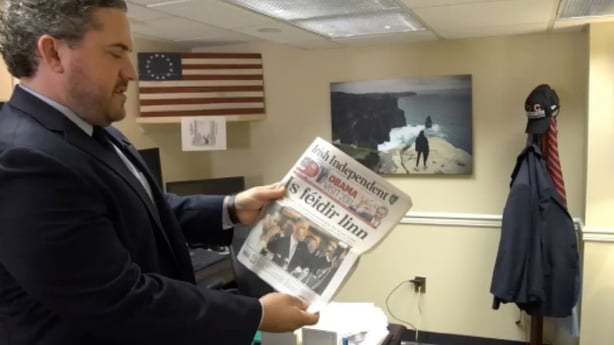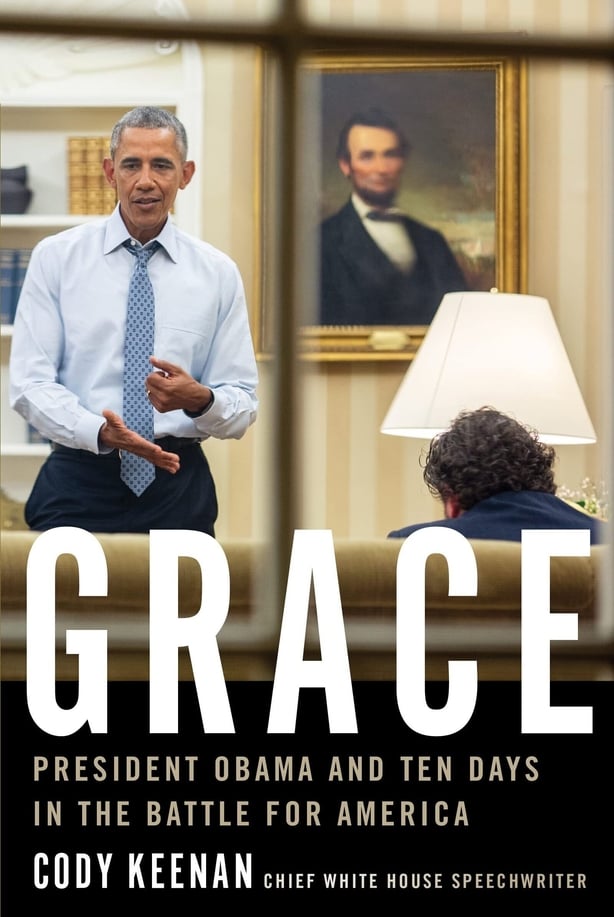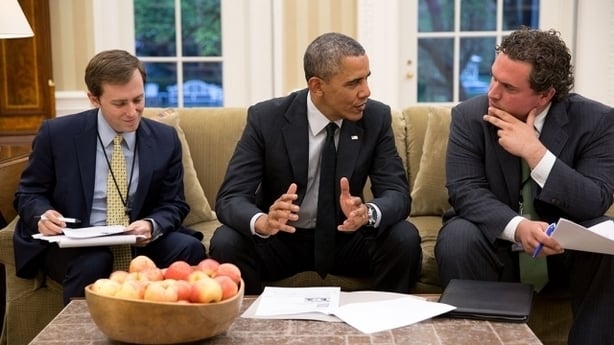Caitríona Perry reviews the new political memoir Grace: President Obama and Ten Days in the Battle for America, by Cody Keenan.
-"Today is the most West Wing day of all the days".
-"This week is too far-fetched for a full season of the West Wing".
An exchange between Cody Keenan, President Obama's Chief Speechwriter, and his soon-to-be wife, the Deputy Director of Research, Kristen Bartoloni on the tenth day of the ten days described in a book that gives some insight into the fast-paced life inside the White House. A particularly hectic period in June 2015 is what Keenan views as the 'Ten Days in the Battle for America’.

presented by then RTÉ Washington Correspondent Caitríona Perry in 2017
The title may seem like hyperbole given what has gone on since that time, but it speaks to how seriously Keenan and his White House colleagues viewed their jobs and their contributions to the country. Keenan describes speechwriters as "idealists who saw being a White House speechwriter not as the pinnacle of a career but as a platform to help make a positive difference in people’s lives".
The ten days refers to an extraordinary period beginning Wednesday June 17th 2015. A time when, in an act of racist terrorism, a white supremacist, self-radicalised 21 year old lone gunman, Dylann Roof, using a semi-automatic weapon he had bought with his birthday money, opened fire in a black Church in Charleston South Carolina killing nine African Americans. The mass shooting sparked a debate about racism, guns and the Confederate flag at the same time that the US Supreme Court was due to rule on Obama’s defining healthcare policy and on marriage equality.
Grace is part presidential chronicle, part personal memoir, and part social history.
There are a couple of references to The West Wing television show and fans of the cult classic will devour this book. It gives a high level, fly on the wall insight into the inner workings of the Obama Administration, how policies were made, how speeches came together and how communications and optics were handled. It’s set largely in a dingy office well below the Oval Office, known as the Speechcave. There are lots of juicy passages about the food in the White House, the food on Air Force One, and tips about where its best to sit in the Oval Office should you be called in to speak to the President (spoiler alert: it involves plumping cushions).
This book lifts the mystique of Obama’s trademark polish to show how the speech ‘sausage’ is made. It demonstrates just how it takes a (mostly nameless and faceless) village working diligently behind the scenes to enable the one person at the top of the food-chain to look and sound good. It will also be an interesting and accessible textbook for prospective wordsmiths learning how to find someone else’s voice and words.
Watch: Grace author Cody Keenan talks to Stephen Colbert
There are challenges and limitations to writing words for another’s voice, as Keenan outlines. How much can a younger white man truly know about the experience of a middle-aged black man? Those challenges present themselves internally for Obama too – how does a black man talk about violence on black people in a black church in a way that speaks to all Americans, no matter their skin tone or belief system? Obama viewed this through the lens of the broader challenge it presented to the very concept of democracy and American ideals. Keenan writes "I appreciated the democracy point. It was hard for one to thrive when some Americans didn’t believe that others should exist, let alone be treated as full and equal citizens".
Conversations on race are at the heart of this book. They saturated the ten featured days, but they also simmered throughout the entirety of both Obama terms. Keenan writes that Obama "didn’t hide from his Blackness", that he "never made his skin the issue" because he didn’t have to. At varying times he was accused of being too Black and at other times not Black enough. "He fully inhabited both worlds, Black and white", writes Keenan as he describes the impact President Obama’s 2011 trip to Ireland had on him. Touring his great-great-great-grandfather’s home in Moneygall, he was "moved…a family connection made no less real by his Black skin". As Keenan points out, one third of those who helped get Obama elected were white people without a college degree, who were attracted by his focus on the economy and jobs. There is also much debate as to whether there could ever have been a President Trump had there not been a President Obama. But that is for another book.

Clearly Keenan and Barack Obama had a close relationship. Keenan writes about his former Boss in understandably glowing terms. He was in awe of the master, demonstrating the dedication, and something bordering on love, that is needed to work the requisite hours, while also displaying the ability to hold one’s tongue when required. These feelings and the bonds described in the book may at times be a little much for an Irish audience, not used to seeing political operatives in this way. Did everyone really all get on that well?
Grace is part presidential chronicle, part personal memoir, and part social history.
Keenan worked with Obama to write his own Presidential memoir and in many ways this is a companion piece. The ‘inside baseball’, or ‘inside the Beltway’, cliff notes to go along with the official text. Unsurprisingly, it’s very well written, the tone is conversational with the light touch that is clearly often required when writing speeches soaked in tragedy, death, disaster, and despair. But Keenan is determined to push forward the hope and joy too.
Readers don’t have to be Obama fans to enjoy this book, but those who aren’t and those who are members of the Republican party will probably struggle at parts. The policies and people featured are mostly true blue-blooded Democrats. Although Keenan tries to mostly maintain his composure in the Epilogue dedicated to the post-Obama President Trump era. There is a dig at the 45th President at one point, when he writes how Obama might dictate tweets but he was never allowed to send them himself. Keenan notes "only morons would allow a president to do that".
‘Grace’ does hark back to a time of some civility in American politics – and it wasn’t that long ago. Hyper-partisanship still existed, but there was mutual respect. A respect and understanding that is not widely on display currently from either party. It was a time that had its own problems and frustrations, but yet feels halcyon, given the current US political stagnation.

President Obama cried speaking about the Sandy Hook school shooting when 20 primary school children and six teachers were murdered. After Congress again failed to take action, Keenan recalls Obama saying "the next time this happens, I don’t want to speak". The President’s Chief Speechwriter discusses in detail that futility felt by those in the pressure cooker environment of the White House. It is striking that all of the comments, all of the conversations, all of the frustrations arose again in the wake of the school shooting in Uvalde, Texas this past May when 19 children and two adults were killed. The remarks could indeed by copied and pasted nearly ten years on from Sandy Hook and seven years after the ten days featured here.
Despite Barack Obama’s reservations, over the Ten Days, a collective decision is ultimately taken that the President will speak at the funeral for the church pastor and South Carolina State Senator Clementa Pinckney, one of the nine killed at the Mother Emanuel African Methodist Episcopal Church. While Keenan stresses the collaborative nature of speechwriting, he also gives self-deprecating credit to his boss for doing the heavy-lifting on the now iconic eulogy. Together they decide to meditate on the concept of grace in the speech – hence the book title. With the President adopting his "preacher voice and cadence", he rallied the congregation, and the television viewers. A stirring moment then, as the President lead those gathered in a seemingly spontaneous rendition of the hymn, Amazing Grace.
Watch: Obama sings 'Amazing Grace' during Pinckney eulogy, via MSNBC
Keenan employs an engaging approach, giving the reader a backstage pass to the drama of high stakes speech-writing. The speech, and Obama’s song burst, have earned a place in history, but in the book, the reader still gets caught up in a game of ‘will they or won’t they’ until the last moment.
Keenan says he has written this book to undercut the cynicism that has flooded US public life in recent times, and it is most definitely a call to arms for public service. That hope that engulfed Obama’s presidency is woven through the book and leads Keenan to conclude with a rallying cry that there is "a story of America that’s worth fighting for", even if some chapters are darker than others.
Grace: President Obama and Ten Days in the Battle for America is published by Harper Collins


